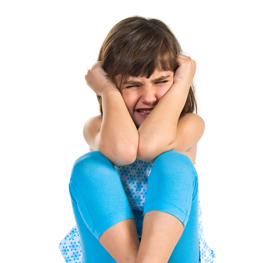
Simmering, seething, white-hot anger. We’ve all felt anger, and our children experience it too. Angry emotions are a normal part of life, and by themselves, they aren’t a cause for concern. But acting out of anger - which can include harming people or property - is a different story, and it’s becoming more common. From a hitting toddler to a temperamental teen, here’s how to help kids keep their cool.
Early Years - NB to Five
Reality bites
While older kids are better at concealing emotions, toddlers wear their hearts on their sleeves. That means that when your toddler is angry, you’ll know - right away. “Toddlerhood is by its very nature an emotional time for young children,” says Lorraine Breffni, Ed.D, director of Early Childhood at Nova Southeastern University. Two year olds are highly impulsive by nature and lack the verbal skills to fully express their anger or frustration. Add in the fact that toddlers are me-centric and lack the ability to understand how their actions impact others, and you have a recipe for hitting and biting. When your toddler hits, bites or scratches another child, don’t lash out; berating a child will escalate a heated situation. Instead, recruit your child to comfort the child they hurt, applying an ice pack, giving a hug and comforting as needed. Afterward, employ a logical consequence by removing your child from the activity if they act aggressively toward their peers. Cutting a playdate short is hard in the short run, but the payoff is a child who understands the importance of self-control.
Elementary Years - Six to 12
Friend mend
Friendships blossom during early childhood years as kids spend more time around peers and develop close bonds. But disagreements and misunderstandings are inevitable when grade-schoolers with budding communication skills spend hours together, and even the sweetest of friendships can turn sour when angry sparks fly. Because the school years can be full of friend conflicts, they’re also rich with opportunity to learn and practice anger management and conflict-resolution skills. Don’t rush to intervene in disagreements between friends, says Bryce Hella, Ph.D., a licensed clinical psychologist at La Rabida Children’s Hospital. Parents should step in only when a fight becomes physical, she notes. “Before policing the situation, encourage problem-solving. Kids may surprise parents with a creative solution to the problem.” Set aside daily time to talk through the day with your child and listen when they pipe up about problems with peers. Validating your child’s feelings and listening to the whole story before offering advice can go a long way toward defusing anger and helping school-agers learn to navigate stormy emotions.
Teen Years - 13 to 18
R-E-S-P-E-C-T
Teens are notoriously moody, but that doesn’t mean that living with one has to be miserable. Though tempers will flare occasionally in any home with teens, parents who build open, communicative relationships with their adolescents have a better chance of maintaining a mutually respectful dialogue during the tumultuous teen years, says licensed therapist Tamara Reilly, M.A., of Greensboro. Surprisingly, though teens may resist parental rules, setting and enforcing expectations for behavior can help dial down angry outbursts. Teens, who know their parents are safe and reliable people who will hold them accountable, are naturally more respectful so communicating consistent expectations around chores, schoolwork, curfews and other responsibilities provides a strong, secure foundation for a respectful home, says Reilly. When parents respond to a teen’s problems with empathy and a genuine desire to understand, teens are more likely to talk things through - and less likely to yell. Which means you can save your earplugs for your teen’s band practice.
Malia is an award-winning health and parenting journalist, and mom of three. Her latest book is Sleep Tight, Every Night: Helping Toddlers and Preschoolers Sleep Well Without Tears, Tricks, or Tirades.
Calgary’s Child Magazine © 2025 Calgary’s Child